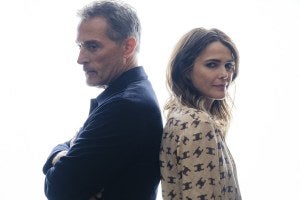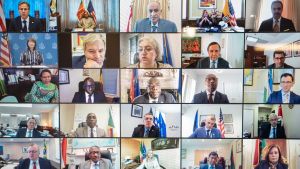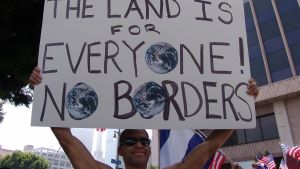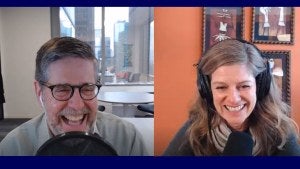Netflix’s “The Diplomat”: Pop Culture Gives Diplomacy a Boost
 Play Podcast
Play Podcast
About the Episode
Netflix’s hit show "The Diplomat" brings real-world diplomacy to the spotlight. On Deep Dish, Executive Producer of Madam Secretary David Grae and career diplomat Maryum Saifee examine the show’s portrayal of diplomats, the importance of sharing these stories in pop culture, and the significance of the State Department finally going to Hollywood.
- Transforming State: Pathways to a More Just, Equitable, and Innovative Institution, Truman Center, March 2021
- US Embassy in UK fact-checks ‘The Diplomat’, US Embassy London & Aaron Snipe, May 2, 2023
[Lizzy Shackelford: INTRO: This is Deep Dish on Global Affairs going beyond the headlines on critical global issues. I'm your host, Lizzy Shackelford with the Chicago Council on Global Affairs.
Movies and shows about the US military or the CIA are a dime a dozen, but the State Department not so much. That may be changing though. Today we're talking about the diplomat, the hit new Netflix political thriller. Keri Russell plays Kate Wyler a career foreign service officer who thought she was on her way to a post in Afghanistan and reluctantly, very reluctantly agrees instead to serve as the new US ambassador in the United Kingdom. Right after an attack on a British aircraft carrier raises global tensions. Here she is learning of her new assignment from the president and his chief of staff…
(SOUNDBITE OF TV SHOW, "THE DIPLOMAT")
I'll admit it, I'm hooked. It's fast paced, fun, and well, it's not exactly true to life. This show does the best job of any fictional account I've seen of depicting what life is like in the foreign service, that difficult marriage between two rising stars and the foreign service balancing work and personal struggles -- That's a totally realistic scenario. The show also manages to show how important the sometimes tedious work of diplomacy is. But being a former diplomat myself, I wonder what's the significance of the State Department getting the Hollywood treatment and can shows like the diplomat actually help build a constituency for diplomacy and help us improve our approach to foreign policy?
So, let's explore the show's themes, discuss the real-world implications of diplomacy, and talk about why it's so important to share these stories in pop culture. To help us unpack pop culture, portrayals of diplomacy. I have with me two people that I always enjoy talking to about these issues.
David Grae was the executive producer and a writer on all six seasons of the CBS political series, “Madam Secretary”, and he's also been a writer on “Without a Trace”, “Castle”, and one of my personal favorites, “Gilmore Girls”.
We're also joined by Maryum Saifee, who's currently a senior advisor in the State Department's Bureau of Cyberspace and Digital Policy. Maryum is a foreign service officer who's worked everywhere from Cairo during the Arab uprisings to Baghdad during the US military withdrawal from Iraq. She also served as a senior advisor in the secretary's office of Diversity and Inclusion. I met Maryum when she was the task force leader behind a report produced with the Truman Center., which outlined ways the State Department can become more diverse, equitable, and innovative. We'll link the Truman Report in the show notes too. Just a note, Maryum is joining us today in her personal capacity, so any information she shares here are her own opinions and they don't represent the State Department.
So, getting back to the diplomat, the new Netflix show, I really wanted to get Maryum’s take on how accurate she thinks it is…]
Maryum Saifee: I actually really enjoyed “The Diplomat” because it really gets behind the scenes, uh, in our day-to-day work. And much of it you won't know about or hear about. And sometimes the name of the game is to not be heard about or not make the news. So people don't know the inner workings and the just the discussions around optics and, their signals and, interagency, which are, you know, even reflected, within the show of, the station chief and the White House and how everything is interplaying. That's very much true. I think that's true. to life. some of the details, you know, the fact that she doesn't have a confirmation, there's sort of some, you know, uh, artistic license that was at play. But to me, I don't think it distracted from the fact that the fun of it. I mean, as someone who's been in the field, as you mentioned in Cairo during the early days of the uprising, the military withdrawal and Baghdad. I mean, these are extraordinary moments and they're really difficult, but makes the job's so fun. And it's why in spite of some of the bureaucracy, especially being back in Washington, that can be frustrating. it's a fascinating career and it's such a gift that I know you were part of the foreign service as well, so you know, firsthand.
Lizzy Shackelford: Yes. I wish that I had seen a few more of us, kind of mid-level worker bees displayed in the, in the scenes. but otherwise, agree with you wholly David, “Madam Secretary” was the first show to kind of put the spotlight on the State Department. Uh, you know, it had a focus more on Washington as the center of it, but why did that topic appeal to you as a writer and a producer, and why do you think American audiences should or would be interested in that topic?
David Grae: Well, it appealed to me because I've just been interested in politics and, especially of late, politics has progressively for the last 20, 25 years, it's gotten a little more interesting. Um, not necessarily fun, people have been paying more attention and particularly I have. So just, um, it's nice to be able to learn something. You know, a lot of the way we looked at the show was “civicstainment” and never at the expense of drama. it was a CBS primetime drama, so we needed compelling action, great storytelling, but we could still slip in the interesting civics lessons. For instance, you know, we did an episode. A few years ago, when, geez, I don't know why, but some people were thinking about how would you remove a crazy president? I don't know why they were thinking that, and we did an episode that was basically a manual, on section four of the 25th Amendment. and what responsible cabinet members would do, who would be involved, it was appealing to me because you know, the stakes could be really super high and just cuz I'm interested and it was fun to be able to have a platform to show the American public you know how these things work.
Lizzy Shackelford: Maryum, I've noticed that “The Diplomat” also feels educational to me in some ways because of some of the themes that they talk about. What were some of the themes that you thought, “The Diplomat's” kind of covered that kind of puts it on the radar of American public?
Maryum Saifee: Well, I thought it was, the internal dynamics in terms of how foreign policy is manufactured a lot of the behind the scenes that takes place that nobody hears about. I thought that was brilliant, uh, the way it was done, and it is very true to life. one piece of it interestingly is in the casting actually, you know, I was curious to see in this moment with our Secretary of State pushing for a more inclusive representation of America within our foreign service, within the actual workforce to see senior level diplomats um, the Deputy Chief of Mission as a Black American, the station chief is Asian American woman. The main character is a white woman. So, you know, even the, foreign minister counterpart is a black British diplomat. So, I don't think we're there yet, to be honest. If I'm frank, I was amongst other diplomats of color in the State Department, we were sort of commenting like if we wish right that, that we would see more of that senior leadership. So I think seeing it actually in a non-tokenized way where they're just hard at work. Tireless work, doing their job. I love the work ethic. We're working these hours that nobody can imagine. And we love the job, but there's a lot of grit that goes behind the scenes and it doesn't happen magically. It's not just dinner parties and cocktail hours. And I think when people hear the word diplomacy, even amongst, you know, my friends and family who are not in this field, they just think that I go around and have cocktails all day. You know, like they don't know how grueling the work is, but in the best way. And so, I hope that message comes across to broader audiences on our work is heroic and people don't see it and it's, fun and exciting and I hope it recruits. Actually, I posted something on LinkedIn just a few thoughts after watching a few episodes and so many young people actually reached out to me, direct messaging. I wanna join, I wanna join, and these are people outside the beltway. You know, these are people in Texas where I'm from, or you know, in places that may not be even be aware about, what this field and what this profession is about.
Lizzy Shackelford: You know, I absolutely agree with you on the diversity side of it. And they say if you can see it, you can be it. And it's been hard inside the State Department to kind of almost, manufacture that because we don't have a lot of diversity in the upper ranks. And so, yeah, I agree. My hope is that young people of color, young minorities are watching this and saying, oh, yep, maybe that's something I can consider. Um, so the show's creator, Deborah Kahn, who also created “The West Wing” and “Homeland”, said “the foreign service is the first in and the last out of every disaster in the world, and nobody knows who they are or what they do.” And, you know, I love that quote. I think it's very true. David, I wanna ask you, what do you think the impact is of sharing stories on this area? And did you consider that impact as a writer? And how did that help you shape some of the themes that you took on episode to episode?
David Grae: Yeah, we always considered the impact. I think just in general, when you're putting something out there for millions of people to see, you have a responsibility to get it right. So, we never portrayed any country the world worse than they actually are. And CBS doesn't like getting protest from a country for whatever reason. I'm not sure why they don't like it, I guess cuz they're an international company and they're selling international rights, but no one likes to get scolded. Um, but, you know, yeah and we would get pushback sometimes, for instance, I did an episode, that was a little bit ahead of, ahead of what was happening, but where we were doing a nuclear deal, with Iran in season one, and on the day that the fictional president of the United States was signing that deal endorsed by Secretary of State Tea Leoni, Iran decided to stone a gay man to death and to show you know, that people in their country that they still had you know, they were still Iran even though they were making a deal with the United States. And I got pushback from corporate at CBS that said, you know, in 2003 or 2004, they changed their official policy that you can't stone gay people to death. And the reality, and we actually partnered with, um, human rights campaign, on this, and we were able to use a fictional president of human rights campaign who was saying that. In the show that the US shouldn't sign the deal cuz they're gonna stone this guy to death. And the reality was, even though that was the government's official position, they still allowed it to happen out in rural areas and villages with tribal councils. And so I just had to say it that way. but it was true and we wanted to get it right, and obviously that's very dramatic. We weren't sacrificing drama. And one of the characters got to argue passionately to our Secretary of state, you shouldn't sign the deal. And he showed her this is the person who's gonna get stoned to death and this is exactly what happens to the human body when you're stoned to death. It's as horrific as it, it sounds, it's even more horrific. and she explained to him how, you know, I should fire you, but I like you that outburst, but also here's why we're doing it. We have to consider the lives of millions of people and taking nuclear off the table and all that. And you know, we consulted with people like Ernie Moniz, Secretary of Energy, who actually was involved in, the negotiations for that deal that they would ultimately make with Iran.
Lizzy Shackelford: Yeah. And I think that you've, picked up on an important issue that I think, comes up when you're trying to take, real life things like diplomacy and foreign policy and put it into a fictionalized space because, you know, it shows the good and the, the bad and the hard and the ugly that goes behind that. And it's not always gonna make, you know, the US government look great, uh, but it gives you that opportunity to kind of explain that. Maryum, I'm curious if you see any, potential drawbacks of portraying, the state department's work and foreign policy in popular media and how we can kind of best navigate that to, you know, to get it an honest and compelling, you know, perspective out there in?
Maryum Saifee: I see no negatives more. I think we need more and more, more Uh, as David mentioned, it's an entry point in civic education more broadly. it's decision making it's imperfect. You're operating with not full information, which you see in the show, and you're making the best decisions you can make, which is, I think, applicable beyond the profession. But I think we need, to recruit diverse applicants across you know, geography, demographics, uh, disciplines, and I think, we need more shows that are depicting these scenarios and the complexity of them and cross-cutting issues. And I think it does it well. especially because there's, a cliffhanger, you know, at the end. I'm not gonna give anything away for those who haven't seen it yet, but I think it's interesting how complex the decision making is behind the scenes that I don't think people appreciate because we're really not, uh, as diplomats, career diplomats in particular, we're told, as a public affairs officer, you should not be the story. Like, in fact, the name of the game is to be behind the scenes. And so when there's no crisis, that doesn't mean that there wasn't a crisis that was brewing. It means that we stopped the crisis, and we were successful as diplomats and it really, I think, highlights that diplomacy needs to be the tool of first resort so that we don't have, the sort of potential war that breaks out that can be so destabilizing. So I think it, makes the case, I hope, for more resourcing, the way our colleagues in the defense sector have and, been able to, to, Successfully advocate because I think the military is highlighted in media and people understand it. They know, what it means to be in the Army or in the Navy. And there's, you know, and of course my mom is a physician. She watched, you know, she, when she watches “Grey's Anatomy”, I'm sure she's horrified by the level of inaccuracy in the surgeries and, you know, in the, uh, but, but that's okay. It's, still highlighting the heroism of healthcare workers. I think we need the same thing for diplomats. a long time coming and grateful to David for breaking, new ground in this, in this area. And I'm. happy to see more shows like this.
Lizzy Shackelford: Yeah, I mean, you've hit on a really important point, which is most of the time when diplomacy is really successful, the story is that there is no story, right? And so that's why the only way to really explain that to the American people is by sharing with them the backstory of how things happen. You know, it reminds me, you know, Maryum, you and I, a couple of years ago, worked on a report with the Truman Project of National Security on transforming the State Department. This was when we were both out of government, and it specifically included a call for more engagement with the entertainment industry. So, you and I have been big believers of this for a while. But do you think that it can help build a broader kind of just public constituency for relying more on diplomacy? You mentioned the resource issue, and I think the resource issue is a huge one. the US military has, has a lot, and if anybody watched “Maverick” or further back “Top Gun”, the US military helped with that, right? It's a huge recruiting tool. But are there ways that pop culture can help build awareness with the people who aren't gonna pursue, you know, international relations careers? Just have more appreciation for the fact that we need to fully fund diplomacy? And how, how can we parlay that interest in it, into action?
Maryum Saifee: You know, the level of buzz around this show, I mean, it's, I thought I would just be interested in it because the acronyms are fun. I felt seen, hearing the word RSO or you know sort of in and on a Netflix show, I thought, wow, like the research was great. You know, but then to see people who are outside of diplomacy, outside of this field, coming up to me and saying, oh, is this what it's like? It's an entry point for me to have conversations about my own career and some of the challenges I've had, and opportunities and the exhilaration of it. It really, I mean, it tests you in so many ways. It sort of wears on the soul sometimes because the decisions, especially when I served in Baghdad, were really hard. I will never forget that year um, and it lives with you and it's not easy. I'm not gonna romanticize it as being, you know, simple and easy. But I think it, it demystifies, I think the profession, it demystifies diplomacy in ways that I think hopefully will mobilize, resources, you know, members of Congress might be interested in saying, okay, we wanna put more res right size a bit and put some resources in diplomacy. Um, again, as a tool for prevention, because it's also investing in the long term institutional health of our foreign policy more broadly. When we look holistically at, you know, of course we need a strong defense sector in military, of course, but we haven't really invested the same level over the years, and this is across administration's in diplomacy and especially now that I'm sitting at this intersection of technology and foreign policy, so needed, so needed, we need guardrails when it comes to emerging tech, like artificial intelligence, that takes diplomatic, negotiations broadly, multilaterally, even at the state and local, level, we need to think creatively and it's, the challenges that we're facing in the 21st century are so much more complex. We weren't even talking about Chat GPT, you know, in December and now look it dominates every conversation. So our diplomats have skills, that can, you know, really shape humanity across different sectors. And so, I think the need for the investment is even greater now, more than ever.
Lizzy Shackelford: Now, David, you've heard what people like Maryum and myself really wanna see these shows do, like, we want them to drive people to apply for the foreign service and make people call their congressman and say, why aren't you funding the State Department more? Uh, that's from our professional side. When you're working on something like "Madame Secretary", you know, and, and looking at "The Diplomat", what are creators of these shows trying to accomplish?
David Grae: Well, number one, we're trying to get the highest ratings possible for our show. So no, but no. So, trying to make the most exciting shows. but it's sort of a chicken egg thing because we are working within the construct of, doing a show in the case of "Madam Secretary", about the State Department and about the Secretary of State. And so we're looking for the most compelling stories, and we have a lot of consultants, you know, we had the Glover Park Group that maybe you've heard of, they're a lobbying group, but they're just with a lot of government experts. And we'd run everything by them to make sure, you know, including like, make sure the flag is in the right place during the, you know, ceremony we're doing.
Lizzy Shackelford: Those things are important!
David Grae: But the, and then we had the groups like Hollywood Health and Society that introduced us, Lizzy, and you know, you consulted with me on a project I'm trying to develop because there are people like you, um, and other experts who want television to get it right, because that is how so many people, learn about these things. I mean, people's knowledge of the State Department might be more influenced by, "Madam Secretary" and "The Diplomat" than anything else, for instance, and I'll tell you a really great story we did, um, I got an email from. our contact from Roberta Krueger at, you know, Hollywood Health and Society, she said, are you interested in killer robots? This was before the beginning of the season. I had no idea what she was talking about. And I said, absolutely. I'm interested in killer robots. And we had, people from, an organization that works to keep certain weapons, you know, Geneva Convention or certain conventions to keep weapons off the battlefield, like lasers that blind. Um, soldiers, which no one's ever heard of because they don't exist because there's a convention to make sure they never were developed by any country on earth. And killer robots are algorithms that make the decision to kill. So not drones that are being operated out of Tampa, wherever, um, by an actual pilot, even though it's unmanned but actual robots that could sent into the field. And the algorithm makes the decision who to kill and when, but we really loved the idea of putting that drama to the test, on our show. And the way we did it was our, you know, character, Secretary of State who became president, has to decide - have an option that there's a beta of one of these things that's being developed over at one of our installations in Europe, and they could use it in this far off place where there'd be a risk of many special operators getting killed. Instead, they could send in killer robots to take out the terrorists, and she chooses not to do that. She doesn't want to let that genie out of the bottle. She doesn't want the US using it. And then American soldiers get killed and we get to tell a story about that. But it, you know, it, again, it's "civicstainment", but from our point of view, it's also compelling drama and tough decision making. And you know, if not for that, like Maryam said, it's not all easy. You have to make tough decisions and that's what we try to dramatize, on a TV show as best we can.
Lizzy Shackelford: Yeah. I love that term, "civicstainment".
Maryum Saifee: "Civicstainment", I wrote it down actually. I love it.
David Grae: And by the way, I should give credit. Uh, I believe Barbara Hall, who is the creator of "Madam Secretary", is the one who came up with that, term.
Lizzy Shackelford: It's such a wonderful concept. and you know, I have to say, there are a lot of papers written out there about killer robots in the ether of academia and policy work, but you're absolutely right, David. The only way that most Americans hear about this issue is going to be, you know, through something that's much more accessible, which is, popular culture. and you've talked about how a lot of consultants, you know, kind of folks who've been in the government, you know, working with different organizations help inform these things. I'm curious with, "Madame Secretary", did y'all interact at all with the State Department itself?
David Grae: John Kerry signed a football for me cuz I like to play with a football in the writer's room and he signed a photograph of himself for Barbara. Um, but, um, in terms of actual, you know, I think we got positive reinforcement. You know, we had Madeline Albright on a couple episodes. I wrote an episode with Madeline Albright called The Doability Doctrine, which is, I don't think too many people knew about it. I thought it was a great doctrine that the United States should get involved when it can, I'm probably overly simplifying it, but that's what was Madeline Albright believed when the United States got involved and cuz of her personal history, with, her family and the Holocaust in World War II. But, um, she believed that things go better when the United States get involved. And we named an episode after her doctrine. and Hillary Clinton and Colin Powell were on the show, but this was after their time in the State Department. but we did have, uh, people who from the Clinton Administration and from the Obama Administra and from other, and all sides of arguments. You know, Republican, we always tried to cover, the waterfront. But the actual State department, I don't think it was like the defense department lending a bunch of fighter jets to “Maverick”, you know, to Brock, Heimer and Maverick.
Lizzy Shackelford: It's an interesting point for me because I do, mean, the Department of Defense does really get involved, the CIA does get involved. Maryum, do you think that the State Department should, start being proactive about that and kind you know getting involved?
Maryum Saifee: Definitely. I think so. I mean, even, normally I think we've had a culture in the past maybe where if you're a career foreign service officer or state department civil service colleague, it's sort of like, oh well can we talk to the press? Can we talk to, it's a little bit of a firewall and I think there's a culture that's shifting a bit. You know, when we produced the Truman Report, I was nervous cuz it was done in when I had my personal capacity and very bold recommendations that were sort of, we need to fix things. And I was surprised it was cleared. Uh, because I didn't know if the, if we'd actually be able to get the permission to be so, um, really bold. I mean, we talked about systemic racism, we talked about mental health. And security clearances. We talked about just a lot of, uh, complex issues that are facing not just the State Department, but many institutions, but given the State Department is the oldest cabinet agency and it needs to be modernized. And I think we're in a moment of modernization with the new secretary, with Blinken, literally crafting a strategy that is in some ways dovetails on a lot of the recommendations we made in the Truman report. Um, in 2021, but I will say that there's a need for, a culture shift, and I think there's a need for more of this. So even me being on this podcast is kind of unusual. I don't think that many foreign service officers would say, yes, and, our colleagues in public affairs are saying, yes, please go out there, talk about your experiences, your diverse lived experiences, how that is an entry point to the career. And I think it's helping us with recruiting, a broader base of, diplomats or future diplomats, um, so that we can have a, I think it links to our foreign policy. I mean, one thing I realized, when I was working on the Truman Task Force report, again in my personal capacity, Was how important the workforce is to the institutional health of our foreign policy more broadly cuz the human beings that are crafting this policy, if they're not doing well, if their wellbeing is kind of, you know, some of the intricacies of the relationship between Kate and Hal how like, you know, the tandem couple, like sort of like some of that it matters, you know, to sort of think about workplace flexibilities. What does that look like? You know, when you have a foreign service couple rising up the ranks and you know, we have technology, people are, I'm working remotely from New York my office is based Washington DC So I think, you know, that culture shift needs to happen, for there to be portrayals of a more flexible modernized foreign service within the media, there's so many types of people in this field, and I think it represents the best of America when I go overseas, me as a non-white diplomat who doesn't look the part, people don't think I'm an American. I've had that often. But that's also a superpower because I can relate to people in different ways and the diversity of who's, who gets to be the face of America, know, when the State Department was first established, yeah, definitely, people like me did not exist, uh, within the institution, but it's, our diversity and it sounds cheesy to say it, but it is our greatest national security asset. it makes us different. It gives us an edge and I think showcasing that, and that's why. I think that country team in London was aspirational to some extent in terms of the representation piece. I'm all for it. It's like if you can see it, and normalize it and make it seem, oh yeah, I could be a deputy chief of mission, I could be the ambassador. I, I've seen it before. If a young kid, if my, you know, 13 year old niece… I don't think she can watch this yet, but whenever she can watch the show, you know, like she'll say, oh yeah, that's no big deal! Like what my aunt does, that's just, normal. And I'm like, that's success to me when it becomes so normalized and it's, just part of the DNA, you know, of the institution.
David Grae: And by the way, if I could correct myself and to build on what Maryam is saying, I'm actually wrong. There was a current high ranking state department official who came into our writer's room and talked to us, Linda Thomas Greenfield, the current US ambassador to the UN, at the time she was Assistant Secretary of Sub-Saharan Africa, and she came into the writer's room and she knocked our socks off. I mean, we were all like, holy cow, she should be the Secretary of State! She should be the President! She should be the President of the world! And, her brilliance, it's just incredible. And she's, an African American woman and she called us out. We had done stories on India, China, Japan, all the South America, Europe, all, all over the world. We had not done, when she came in, any stories about Sub-Saharan Africa, black Africa, basically. And she was absolutely right and she was so amazing that not only, of course, then we did stories about Sub-Saharan Africa, but we made her a character, a different name. But we made the Deputy Assistant Secretary of Sub-Saharan Africa a character. Um, then when, Tea Leoni's character became president, in our final season, that character, became the Secretary of State.
Maryum Saifee: Oh, amazing. Wow.
David Grae: So, you know, it wasn't so much that we didn't have diversity, but we weren't doing stories about Sub-Saharan Africa. so yeah, and I totally agree that's important to put out there.
Lizzy Shackelford: Well, and I can speak for myself and Maryum, I imagine you agree. Neither of us are surprised that LTG, as she is known in the State Department, would be the one to go out, blow your socks off on that and basically take it head on to make sure that parts of the world that are underrepresented made it into this popular culture.
Maryum Saifee: Oh absolutely. Absolutely.
Lizzy Shackelford: I wanted to wrap up with one last question for both of you, which is what stories, you know, whether kind of within the State Department and the foreign service or more broadly, would you like to see portrayed and that you think be important to share with the American people that maybe aren't quite out there yet?
Maryum Saifee: I mean, this is a great question. And maybe because I'm currently in this bureau focused on technology all the time, it's on my brain, but sort of these intersections, these cross-cutting issues, um, That really touch different sectors. So diplomacy is one piece, but we're now building bridges with the private sector. So maybe something on sort of AI emerging tech, and how that intersects with foreign policy. Like that could be an interesting storyline for a future show/ season. But I think it's, interesting to kind of showcase, the intersectionality of sectors, and how these issues are cross-cutting. I think that we're in a moment I think where we're breaking out of silos, even within the State Department, which is, the most boxiest of, I don't know what to say, bureaucracies in some ways, but we're having to learn to kind of break out of that. So I think, uh, shows that are sort of showcasing some of that would be really interesting.
Lizzy Shackelford: David, what would you like to take on?
David Grae: Yeah, I mean, I would like to see, you know, more of the United States as a force for good in the world, which, you know, we did on “Madam Secretary”. I haven't seen the diplomat. I assume that's what they're doing, um, in the diplomat. honestly, just to counter the narrative out there, among too many people, in my opinion, in the United States who think that we shouldn't worry about the rest of the world. We shouldn't worry about Ukraine, as someone may have mentioned on a forum the other night on CNN, UM. And just to counter that narrative and to show it. You know, the one thing drama does, is it shows, it doesn't tell, it's the first thing you learn in creative writing class in high school or college show don't tell you know, when you dramatize something on television, it hits people emotionally and that's where, you know, it really means something. And, uh, I know that it's necessarily, what else, cuz I think “Madam Secretary” covered a lot. I'm sure the diplomat is. It's more. It's just more, and I think that these are incredibly worthy stories to tell. And, and because I do think there is a responsibility among the creative community to get in there and you know, put a mirror up to nature to show people, because it is gonna be the opportu, the only opportunity that an enormous percentage of Americans and other people in the world are gonna have to learn about some incredibly important issues and they're not gonna read a position paper on it. They're not gonna read a journal article that, you Lizzy or Maryum are gonna read. And I'm not either, unfortunately, Uh, but we are gonna watch a TV show that might talk about that issue. You know, we became passionate on the show about de-alerting nuclear weapons. We thought that could be a compelling story, and Bruce Blair, one of the foremost experts in the world on that issue, came and, and he talked to us. Joe Cirincione at Ploughshares said he'll keep his phone on all night. I could call him anytime. and we tried to talk to people on the other side of the issue, uh, which Bruce Blair found was very funny because the other side is, you know, the Defense Department. But you know, to put out there something that that we thought just. The United States public deserves to know that the Cold War may be over, but you know, the president has 5 or 10 minutes to decide to launch our ICBMs, if we believe that Russia's launched a strike, it's absolutely terrifying stuff. But we laid the whole thing out and now a few more million people know about it than did before, and I think, so it's matter of quantity, in my opinion. There should be more, and it's worthy of putting out there not only for dramatic compelling reasons, cuz it's good tv, but also because it's important for people to know and it's the only way most people are going to know.
Lizzy Shackelford: David Grae and Maryum Saifee, thank you for joining us today. This was a really fun and important conversation, and I appreciate you both for discussing how to bring diplomatic stories to the forefront and what that means for the future of our foreign policy.
Maryum Saifee: Thank you for having us.
David Grae: Thank you for having us.
[Lizzy Shackelford: OUTRO: And thank you for tuning in to this episode of Deep Dish.
A reminder that we wanna hear more from you, our listeners. So send us an email, or better yet, a voice memo to deepdish@globalaffairs.org -- You can suggest issues you'd like us to cover, or guests you'd wanna hear from, or you can just let us know how you think we're doing!
And if you're looking for more Deep Dish in your podcast diet, tap the follow button on your podcast app. Then you'll get each new episode once it's released. And if you think you know someone who would like today's episode, please share it with them. As a reminder, the opinions you heard here belong to the people who express them and not to the Chicago Council on Global Affairs.
This episode is produced and edited by Kyra Dahring and mixed by Frank McKearan at Aphorism Productions.
Thank you for listening. I'm Lizzy Shackelford and my co-host Brian Hanson, will be back next week with another slice of Deep Dish!]






Related Content
 US Foreign Policy
US Foreign Policy
America's diplomats are still critical for US foreign policy, but the foreign service must become more flexible to engage the next generation and solve today's problems, our guests argue. What would change look like?
 Public Opinion
Public Opinion
In mainstream media outlets, Millennials have spent the last decade on a multi-industry killing spree. Now Millennials, along with neighboring Gen X and Gen Z, are coming for your politics.
 US Foreign Policy
US Foreign Policy
Get ready to meet Brian Hanson and Lizzy Shackelford – the voices behind Deep Dish.
